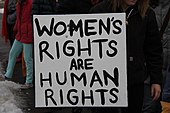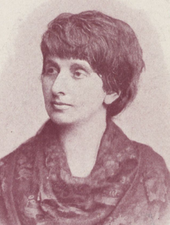Women's nature and law

Der Frauen Natur und Recht , an essay by Hedwig Dohm published by Wedekind & Schwieger, Berlin, in 1876 , deals with the problem areas of the attributes attributed to women and the necessity of the “right to vote for women” or the right to vote . The relaxed, often ironic-satirical style is appropriate to the socio-political topic, because in other countries the organization of associations for women's suffrage or voting rights was already further than in the new empire of 1871 . The social role of women in Germany had changed less than in the United Kingdom or the United States of America . And, as everywhere, it came down to the behavior of the men who held political and military power in their hands when it came to changing suffrage and equal rights for women.
With her work Der Frauen Natur und Recht , published in 1876, she fueled the previously cautious debate about the introduction of women's suffrage . She no longer bothered to explain why women needed the right to vote, rather she asked why they still didn't have it.
Women's nature and law
Content of the essay
The essay consists of two parts. In the first, she uses many examples to present the assessment of women by men. She asks five questions for the investigation:
- What qualities do the majority of people think women have?
- According to the verdict of men, what characteristics should or should the sexual character of women consist of?
- Why do men demand these qualities from women?
- What are the real characteristics of women?
- Do these characteristics form the sex character of women?
She concludes her statements, which are very argumentative and sometimes witty and ironic about the male thoughts and wishes regarding women who want to "train" them according to their ideas, with the somewhat pathetic conclusion that the true nature of women will change in the future will enforce and be recognized:
“This inner urge of the woman to develop her strength is not a corruption of nature, but the ardent longing to return to her.
Even today we are looking for the ideal of women in a direction that is hostile to progress, and we strive to perfect training.
But ideality has nothing to do with such a moral galvanization; it goes hand in hand with nature. And that is the struggle that takes place in the woman's soul - the struggle between nature and dressage.
Who will win in this battle?
Not the dressage; for it is the work of dead generations.
But from the future, perhaps a distant one, when there are no longer any barriers to the free development of women, a generation will flourish, whose glory we can hardly imagine today, a generation full of beauty and grace, full of strength and intelligence, because ultimately nature remains always a winner because she is one with the truth and indestructible. "
The second part deals with the reasons and arguments of men regarding voting rights, which are summarized in the following theses:
- Women don't need the right to vote
- The women don't want the right to vote
- You don't have the ability to exercise it
- Of course, her gender excludes women from any political action.
All these often ridiculous arguments of men are dealt with in detail and very often taken to the point of absurdity. Then, in the final part of her remarks, she goes into the two most important arguments women make for voting rights:
“We have discussed some of the main reasons men have against women's suffrage, now let's turn to some of the arguments on which women base their political claims.
- Women claim the right to vote as a natural right to them.
- They claim it as a moral necessity, as a means of ennobling themselves and the human race.
The immediate, practical consequences of voting may not be the most important. The main thing, however, is this: the granting of voting rights is the step across the Rubicon. It is only when women have the right to vote that the agitation for the great reforms that are the goal of our endeavors begins. Participation in political life makes all other questions open.
The women claim the right to vote as their right. Why should I prove first that I have a right to do so? I am a person, I think I feel, I am a citizen of the state, I do not belong to the criminal caste, I do not live on alms, that is the evidence I have to provide for my claim. In order to exercise the right to vote, the man needs a certain place of residence, a certain age, a property, why does the woman need more? Why is woman on an equal footing with idiots and criminals? no, not the criminals. The criminal is only temporarily deprived of his political rights, only the woman and the idiot belong in the same political category. "
From today's perspective, on the other hand, there is not much that can be said, in the empire the opinion was very different from today's general opinion. But how women get their voting rights, how they can fight for women's suffrage, that remains open in the essay until then. Towards the end of the text, the author asks the crucial question of gaining power and enforcing the demands in Germany. Ultimately, it is based on the common sense of men and people as a whole, according to the motto that human rights have no gender, that is, women are entitled to vote by natural law .
“How do you get power?
For the time being solely through the concentration of all female forces who are ready to stand up for the political rights of women, through the organization and energetic management of associations.
Women's voting rights exist in every major city in England and the United States. Not so in Germany. Perhaps there are also many women among us who are prevented only by the lack of an organization from developing agitational activity and using words and deeds for the great reforms of women of the future. Or does the German woman, the always tired Sleeping Beauty, want to sleep forever? Wake up, Germany's women, if you have a heart to feel the sufferings of your fellow sisters and tears to weep for them, may you yourself rest in the lap of happiness. Awaken when you are grim enough to feel your humiliation and sense enough to see the sources of your misery. Demand the right to vote, because the right to vote is the only way to achieve independence and equality, freedom and happiness for women. Without political rights, your souls may overflow with compassion, goodness and nobility, you are powerless against the most monstrous crimes that are committed against your sex.
Pull yourself up! Get organized! Show that you are capable of enthusiastic devotion and through your deed and your word awaken the consciences of men, shake their hearts and convince the spirits! Do not rely on the help of the German men! We have few friends and like-minded people among them. Many praise and love women, they flatter them and are willing to play providence towards them if they are not expected to make too great sacrifices. Few would like to be found willing to assist them when it comes to gaining their immortal citizenship in humanity.
Be courageous, help yourself, and God will help you. Remember the American Emerson's bold words: "Always do what you are afraid to do."
You poor women and victims of gender despotism, you have so far sailed the sea of life without steering and without sails and that is why you have seldom reached the shore and the ship of your happiness has mostly failed because of the calm or in the storm. From now on, let the right to vote be your rudder, your own strength be your sail, and then confidently entrust yourself to the sea, its storm and its cliffs, and sooner or later you will see land, the land that you "sought with your soul «For centuries, even millennia, the land where women do not belong to men but to themselves. When the Englishman Somerset brought a slave with him to England, Lord Mansfield declared, in spite of the prejudices of his time, that the slave was free for the simple reason that in England no one could be a slave.
Women are also free, because in a state of free people there can be no unfree.
Human rights have no gender. (Emphasis by the editor) "
Other early writings
The following texts were written in the first productive 1870s:
-
What the pastors think of women , 1872
- Revised What the Pastors Think . Ala, Zurich 1986, ISBN 3-85509-027-0
-
Jesuitism in the household . A contribution to the question of women. 1873
- New edition False Madonnas. Jesuitism in the household from 1893 . Ala, Zurich 1989, ISBN 3-85509-030-0
-
The Scientific Emancipation of Women , 1874
- New edition Emancipation. The scientific emancipation of women . The text from 1874 (and other writings by and about Dohm up to 1919.) Ala, Zurich 1977, ISBN 3-85509-008-4 (About the university access. Also in Marlis Gerhardt, ed .: Essays of famous women. Lou Andreas -Salomé ; Hannah Arendt ; Else Lasker-Schüler ; Marieluise Fleißer ; Ulrike Meinhof ; Silvia Bovenschen and others Insel, Frankfurt am Main 1997, ISBN 3-458-33641-9 )
literature
About the author:
- Kerstin Wolf: Hedwig Dohm (1831, Jülich - 1919, Berlin) - sharp-tongued and pointed writer. In: Damenwahl - 100 years of women's suffrage, edited by Dorothee Linnemann. (= Writings of the Historisches Museum Frankfurt, Volume 36) Frankfurt am Main, 2018. ISBN 978-3-95542-306-3
- Heike Brandt: Human rights have no gender - The life story of Hedwig Dohm . Beltz & Gelberg, Weinheim and Basel 1995, ISBN 978-3-407-80688-8
- Isabel Rohner: Traces into the now. Hedwig Dohm - a biography . Ulrike Helmer Verlag, Sulzbach im Taunus 2010, ISBN 3-89741-299-3 .
About the essay:
- Dissertation by EJ Guenther on translation problems of the essay “The nature and law of women” (pdf) accessed on November 11, 2018
Wikilinks
- Literature by and about The women nature and law in the catalog of the German National Library
- The edition Hedwig Dohm
See also
Individual evidence
- ↑ Women's Nature and Law. On the question of women. Two treatises on the characteristics and voting rights of women , 1876 ( digitized and full text in the German text archive ) - new edition (reprint): Ala, Zurich 1986, ISBN 3-85509-029-7
- ↑ Kerstin Wolf: Hedwig Dohm (1831, Jülich - 1919, Berlin) - sharp-tongued and pointed writer. In: Damenwahl - 100 years of women's suffrage, edited by Dorothee Linnemann. (= Writings of the Historisches Museum Frankfurt, Volume 36) Frankfurt am Main, 2018. P. 50/51
- ↑ Text of the essay “Der Frauen Natur und Recht”, accessed on November 11, 2018



